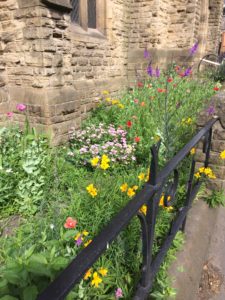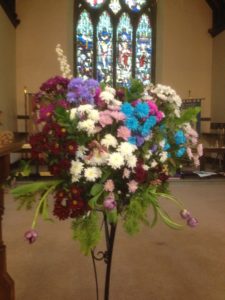The order of service
To download a copy of the order of service as a pdf please click here:
21 09 12 15th Sunday after Trinity Eucharist
To download a Microsoft Word version of the order of service please click here:
To watch the service on Youtube, please click here:
The Readings
Isaiah 50. 4 - 9a
The Lord God has given me
the tongue of a teacher,
that I may know how to sustain
the weary with a word.
Morning by morning he wakens—
wakens my ear
to listen as those who are taught.
The Lord God has opened my ear,
and I was not rebellious,
I did not turn backwards.
I gave my back to those who struck me,
and my cheeks to those who pulled out the beard;
I did not hide my face
from insult and spitting.
The Lord God helps me;
therefore I have not been disgraced;
therefore I have set my face like flint,
and I know that I shall not be put to shame;
he who vindicates me is near.
Who will contend with me?
Let us stand up together.
Who are my adversaries?
Let them confront me.
It is the Lord God who helps me;
who will declare me guilty?
All of them will wear out like a garment;
the moth will eat them up.
Mark 8. 27 - end
Jesus went on with his disciples to the villages of Caesarea Philippi; and on the way he asked his disciples, ‘Who do people say that I am?’ And they answered him, ‘John the Baptist; and others, Elijah; and still others, one of the prophets.’ He asked them, ‘But who do you say that I am?’ Peter answered him, ‘You are the Messiah.’ And he sternly ordered them not to tell anyone about him.
Then he began to teach them that the Son of Man must undergo great suffering, and be rejected by the elders, the chief priests, and the scribes, and be killed, and after three days rise again. He said all this quite openly. And Peter took him aside and began to rebuke him. But turning and looking at his disciples, he rebuked Peter and said, ‘Get behind me, Satan! For you are setting your mind not on divine things but on human things.’
He called the crowd with his disciples, and said to them, ‘If any want to become my followers, let them deny themselves and take up their cross and follow me. For those who want to save their life will lose it, and those who lose their life for my sake, and for the sake of the gospel, will save it. For what will it profit them to gain the whole world and forfeit their life? Indeed, what can they give in return for their life? Those who are ashamed of me and of my words in this adulterous and sinful generation, of them the Son of Man will also be ashamed when he comes in the glory of his Father with the holy angels.’
Scripture quotations are taken from the New Revised Standard Version Bible: Anglicized Edition, copyright © 1989, 1995 National Council of the Churches of Christ in the United States of America. Used by permission. All rights reserved worldwide. http://nrsvbibles.org
The Sermon
By Joe, a Reader at St Mary's.
In the name of the Father, Son and Holy Spirit, Amen.
CS Lewis, in a 1944 pamphlet for the Electrical and Musical Industries Christian Fellowship, wrote:
“I didn’t go to religion to make me happy. I always knew a bottle of port would do that. If you want a religion to make you really comfortable, I certainly don’t recommend Christianity.”
Of course, Christianity will bring us joy and ultimate salvation, and Jesus reminds him that he will relieve us of our burdens, but the process of getting there might be hard going. In fact, in scripture, we’re reminded that if we follow Jesus, people may well hate us for it; in some cases Christians may die for our faith.
So…I’ll start today by asking the question ‘Will Christianity make us uncomfortable?’ to which I’d reply ‘Only if it’s done properly’.
Today’s Gospel reading includes the following two statements from Jesus:
He famously admonishes Peter with the words ‘Get behind me, Satan’.
He tells his disciples ‘If any want to become my followers, let them deny themselves and take up their cross and follow me’.
The people are becoming aware of this new teacher amongst them; some are saying that he is a returned Old Testament prophet, or Elijah, or even that he is the recently executed John the Baptist. And a number will no doubt be wondering whether He is the promised Messiah come to free the people of Israel from their Roman occupiers.
Peter tells Jesus that he believes him to be the Messiah, but when Jesus starts telling the people that He will be abused, tried, executed and will rise again from the dead Peter tries to tell Jesus to not say these things. After all, if Jesus is the Messiah the people are hoping for – the one who will free them from oppression – how can he do this by dying? I can imagine Peter thinking that all Jesus needs to do is call upon an army of angels to defeat the Romans, and poof! Society will be purified, Israel’s supremacy amongst the nations will be secure, all will be good! Of course, Peter is thinking in purely worldly terms; he misses the point of what Jesus is saying, and His teacher swiftly admonishes him.
The words ‘Get behind me, Satan’ may seem quite harsh to us. In Judaism – and we need to bear in mind that Jesus and his followers are Jews and are steeped in those traditions – Satan is often regarded as a being subservient to God but representing the evil intentions within all men. When Jesus says ‘you are setting your mind not on divine things but on human things.’ to Peter, He is telling Peter that the Messianic promise Jesus offers is not dealing with the local problem of the Roman garrison, but the over-arching issue of the saving of mankind and the defeat of death that can only be obtained through His sacrifice on the cross.
And Satan has already attempted to tempt Jesus with Earthly prizes – like dominion of all the land he could see from the top of the Temple in Jerusalem – when he tempted Jesus during Jesus’s time in the desert.
As Jesus had seen off the tempter himself, he was clearly not going to be deflected from His path by Peter, who in mis-understanding Jesus has effectively become an unwitting mouthpiece for Satan. Peter is projecting his own thoughts and desires as to what the word ‘messiah’ means to him on to Jesus, rather than understanding Jesus’s true Messianic destiny, which must lead to the cross.
Jesus then goes on to tell the people listening that if anyone wants to follow Him, they must deny themselves, take up their cross and follow Him. Let’s break this down.
What does it mean ‘to deny oneself’? These days we look at this in terms of not following up on our desires, delaying gratification or generally ‘doing the right thing’. We might deny ourselves puddings if we want to lose weight, or put off spending money if it would cause us some problems. But This is trivial compared to what Jesus meant; to his listeners, the idea of self was wrapped up with where they belonged in terms of community, class, sex, caste, freeman or slave. To be asked to deny themselves wasn’t about giving something up; it was about transformation. They were being asked to transform themselves – to turn their back on where they were in society and life, and start afresh.
Hearing the phrase ‘pick up your cross’ would probably cause the number of potential followers to thin out somewhat. The cross was recognised as a tool and symbol of oppression, torture and death. Crucifixion was the punishment for treason, for example. It was a humiliating, slow, public and painful death. Were you to be sentenced to be crucified, ‘picking up your cross’ had a literal meaning – you were expected to carry the means of your own execution to the execution site. Today we understand taking up your cross as a symbolic means of describing engaging in struggle; to Jesus’s audience there was little that was symbolic about it. Following Jesus could get you killed.
To genuinely follow Jesus – to walk in his footsteps, follow his ways – involved massive sacrifice. You would be denying your role and place in your existing society to join the followers of an itinerant, potentially heretical teacher from a non-descript part of the country whose teachings managed to upset both secular and religious authorities. Apart from turning your back on society and losing any social standing you had, and probably falling out with family and friends, imprisonment and execution would be ever-present threats.
As Lewis said ‘If you want a religion to make you really comfortable, I certainly don’t recommend Christianity.’
For those of us in this Church this morning, it’s unlikely that we will suffer imprisonment and death as the price for following Christ. Jesus reminds us that in today’s reading that it is a possibility. But we need to look at our society, our friends and family, our social media lives, the world in which we live and ask ‘Are we denying ourselves when we need to to follow Christ? Are we picking up our cross? Are we making the sacrifices we can make – even if they are desperately uncomfortable – to allow us to more closely follow Jesus? The world today asks a lot of us if we are to truly follow Christ. All Christians must be wary of what Bonhoeffer called ‘cheap grace’.
“Cheap grace is the preaching of forgiveness without requiring repentance, baptism without church discipline, communion without confession, absolution without personal confession. Cheap grace is grace without discipleship, grace without the cross, grace without Jesus Christ.”
In other words following Jesus without denying ourselves, without picking up our cross, without ‘walking the walk’. Cheap grace gives us a cheap copy of Christ.
Let’s look to see how we, in our lives, can deny ourselves, pick up our personal crosses, and experience the joy, discomfort and genuine grace of truly following Jesus.
Amen.
The Prayers
Prepared by Veronica.
In the power of the Spirit and in union with Christ, let us pray to the Father.
O God our Father, we bring before you the needs of our world, particularly the sufferings of those in war zones, who feel themselves abandoned by their friends to tyranny, are refused access to asylum, with no vaccines to help them fight infection, or are dealing with the results of climate change. We pray that the wealthy countries of the world will work together to relieve suffering, protect the weak, and share resources such as vaccines with those without access to them. We remember Christ’s teaching “Whatever you did for the least of these brothers of mine, you did it for me.”
Lord, in your mercy,
hear our prayer.
We pray for the Church worldwide that all who call themselves Christians may work together to serve your people in whatever way is most help to them in their circumstances. We pray for our Archbishops, our diocesan bishops, this parish of St Mary’s Walkley and all who work so hard to maintain our services for our own congregation, and thank you for the support of our partner churches St John’s and St Mark’s. Help us all to demonstrate that our churches are open and welcoming to everyone who finds their way into them, whether to services or, as last weekend, an event like the Horticultural Show.
Lord, in your mercy,
hear our prayer.
We pray for our community, both the City of Sheffield and Walkley, giving thanks for all those people who give freely of their time and talents to support their neighbours in so many ways. Encourage those organisations trying to restart their normal activities after the difficulties of the last eighteen months. Bless our schools and teachers, especially our own St Mary’s School as they start the new school year, also all the students returning to our universities, who are unsure as to exactly what this year may bring.
Lord, in your mercy,
hear our prayer.
We pray for all who are ill at this time, physically or mentally, after a time of great stress for many in their work, particularly NHS and Care workers. Give them strength to cope with the circumstances they are faced with, particularly the huge backlog of treatments which have had to be postponed because of corona virus, and those suffering pain as a result.
Lord, in your mercy,
hear our prayer.
We remember before you all who have died recently, also all who died in the twin towers tragedy 20 years ago. We remember before you by name Muriel, and others known to us in a moment of quiet. Be with all those who mourn.
Lord, in your mercy,
hear our prayer.
Rejoicing in the fellowship of Mary, John and Mark and all your saints we commend ourselves and all creation to your unfailing love.
Merciful Father
Accept these prayers
for the sake of your Son
our Saviour,
Jesus Christ.
Amen.
Common Worship: Services and Prayers for the Church of England, material from which is used here, is copyright © The Archbishops’ Council 2000






